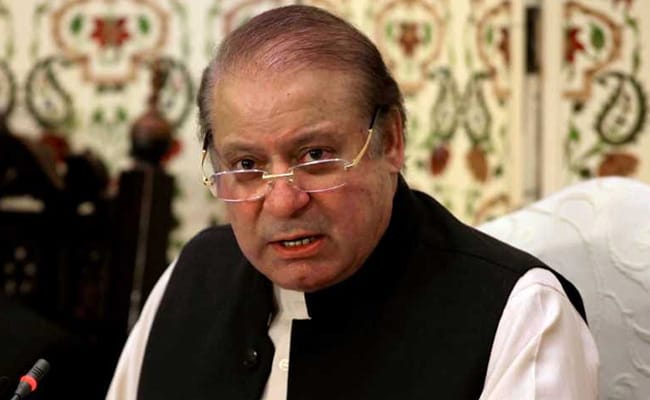
Nawaz Sharif said Pakistani terrorists "crossed the border" to attack Mumbai in 2008. (File)
Islamabad:
Pakistan's leading daily Dawn is facing restrictions in distributions after it published an explosive interview with ousted Pakistan Prime Minister Nawaz Sharif where he made a controversial remark on the 26/11 Mumbai attacks, according to an international media watchdog. Mr Sharif appeared to admit that Pakistani terrorists were behind the Mumbai attacks in 2008, in which 166 people died.
International media watchdog Reporters Without Borders (RSF) said distribution of Dawn, Pakistan's oldest newspaper, had been restricted in much of the country. In an interview to Dawn newspaper earlier this month, Nawaz Sharif, for the first time, questioned Pakistan's policy to allow the "non-state actors" to cross the border and "kill" people in Mumbai.
"Militant organisations are active. Call them non-state actors, should we allow them to cross the border and kill 150 people in Mumbai? Explain it to me. Why can't we complete the trial?" Mr Sharif said, according to the newspaper.
The international media watchdog said the blocking of the Karachi-based newspaper beagn three days after the interview was published. "According to RSF's information, distribution is being disrupted in most of Baluchistan province, in many cities in Sindh province and in all military cantonments," Reporters Without Borders said in a statement issued on Friday.
Mr Sharif's comments triggered a controversy in Pakistan. The country's top civil and military leadership condemned his remarks, even promoting the National Security Committee (NSC) - Pakistan's top civil-military body - to call a high-level meeting. Pakistan Prime Minister Shahid Khaqan Abbasi said that Mr Sharif clarified to him that his statement about the Mumbai terror attack was "misreported".
However, an unfazed Nawaz Sharif stood by his remarks.
The Press Council of Pakistan warned Dawn's editor that the newspaper breached the ethical code by publishing content that "may bring into contempt Pakistan or its people or tends to undermine its sovereignty or integrity as an independent country", Reporters Without Borders said. Condemning what it called "unwarranted blocking" of the Karachi-based daily, the media watchdog said the Pakistani military is determined to maintain their grip on access to news and information in the country.
"It is clear that the military high command does not want to allow a democratic debate in the months preceding a general election. We call on the authorities to stop interfering in the dissemination of independent media and to restore distribution of Dawn throughout Pakistan," Reporters Without Borders said.
India has long accused Pakistan-based Lashkar-e-Taiba of carrying out the attacks in Mumbai on 26 November, 2008, that left 166 people dead and many injured after 10 terrorists with backpacks, automatic weapons and grenades launched a three-day siege on India's financial capital targeting multiple locations.
International media watchdog Reporters Without Borders (RSF) said distribution of Dawn, Pakistan's oldest newspaper, had been restricted in much of the country. In an interview to Dawn newspaper earlier this month, Nawaz Sharif, for the first time, questioned Pakistan's policy to allow the "non-state actors" to cross the border and "kill" people in Mumbai.
"Militant organisations are active. Call them non-state actors, should we allow them to cross the border and kill 150 people in Mumbai? Explain it to me. Why can't we complete the trial?" Mr Sharif said, according to the newspaper.
The international media watchdog said the blocking of the Karachi-based newspaper beagn three days after the interview was published. "According to RSF's information, distribution is being disrupted in most of Baluchistan province, in many cities in Sindh province and in all military cantonments," Reporters Without Borders said in a statement issued on Friday.
Mr Sharif's comments triggered a controversy in Pakistan. The country's top civil and military leadership condemned his remarks, even promoting the National Security Committee (NSC) - Pakistan's top civil-military body - to call a high-level meeting. Pakistan Prime Minister Shahid Khaqan Abbasi said that Mr Sharif clarified to him that his statement about the Mumbai terror attack was "misreported".
However, an unfazed Nawaz Sharif stood by his remarks.
The Press Council of Pakistan warned Dawn's editor that the newspaper breached the ethical code by publishing content that "may bring into contempt Pakistan or its people or tends to undermine its sovereignty or integrity as an independent country", Reporters Without Borders said. Condemning what it called "unwarranted blocking" of the Karachi-based daily, the media watchdog said the Pakistani military is determined to maintain their grip on access to news and information in the country.
"It is clear that the military high command does not want to allow a democratic debate in the months preceding a general election. We call on the authorities to stop interfering in the dissemination of independent media and to restore distribution of Dawn throughout Pakistan," Reporters Without Borders said.
India has long accused Pakistan-based Lashkar-e-Taiba of carrying out the attacks in Mumbai on 26 November, 2008, that left 166 people dead and many injured after 10 terrorists with backpacks, automatic weapons and grenades launched a three-day siege on India's financial capital targeting multiple locations.
Track Latest News Live on NDTV.com and get news updates from India and around the world

